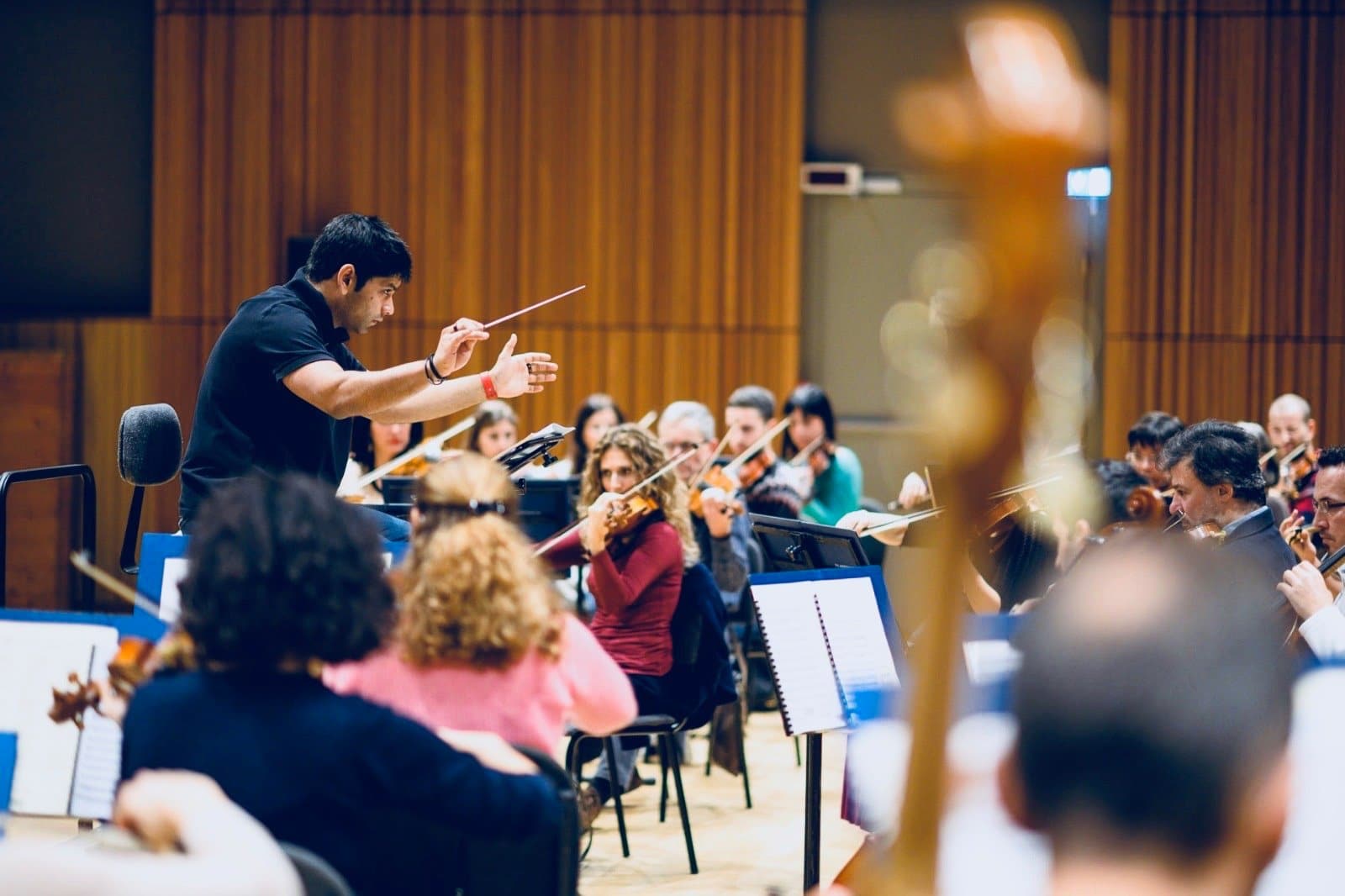The Critic: These are the conductors of the future, like it or not…
NewsFrom my new essay in The Critic:
…Thirty years ago, I ended my book The Maestro Myth with the words, “the great conductor has paved the way to his own extinction”. That prediction has now come to pass. The Great Conductor is defunct.
What we are left with is a slew of featureless Finns, toothy young women, rigged competition winners and outright wannabees. The future of conducting has never looked so bleak. With the exception of the sleeveless Greek, Teodor Currentzis, who dresses one generation too young for his age, and the media-savvy Gustavo Dudamel and Nézet-Séguin, the middle-aged shelf is bare….
(However), I believe six under-40s have got what it takes, and half a dozen talents is (more) than we have seen any time since the last century….
Read on here.







What puzzled me since long ago is the fact that many pianists turned to conducting!!!!Apart from Barenboim who managed to do both activities,I wonder if other pianists who turned to conducting choses this option…becaus e it is easier!!!AM I wrong?
Surely they were out of inspiration to keep on playing the same piano repertoire over and over again!
Recently I saw a concert on Arte with a conductor who was proud to say he was violonist…..who turned to conducting…!!
Business comes before music.
That is the answer to me!
Audiences seem to marvel at the transformation of a former soloist who has now attained the heights of perfection enough to enter the privileged domain of conducting. However, the answer is not as complicated as it looks.
They simply have to keep paying those bills once their chops start to fail them, when their agents can’t book as frequently as they used to.
Jean-Pierre Rampal did conduct in his later years, but in the end, was he remembered as a conductor or Flutist?
When asked why he chose the baton over the bow, Heinrich Schiff once told me: “It pays more”.
There are probably more stories to be told like the ones I’ve just mentioned.
“””It pays more””
Nothing more to add!
Vladimir Ashkenazy is probably the best example of a world-class pianist who found equal success and acclaim as a conductor.
Acclaimed by…? Ashkenazy is one if my favourite pianists and by far the nicest musician I have ever worked with, but HE CAN’T CONDUCT. Ashkenazy is the typical case of “conductor” who does not know that the orchestra is doing the job for him, and with orchestras of not so high technical level he would never be able to do anything (he even had some issues in Iceland with this).
Great musician, great pianist… but that is not enough to stand in front of an orchestra. If he had used some years to acquire a conducting technique and the other skills and knowledge needed it would had been a different story. Still, for non-conducting reasons it was always a pleasure to see him walk into the rehearsal room.
I sat behind the orchestra for a program played by the Czech Phil. in S.F.’s Davies Hall that was conducted by Ashkenazy. I’ve played under hundreds of conductors in my time. Although, admittedly, not quite at that level. Regardless, I understood everything Ashkenazy was wanting and I could have very easily played under him. The concert was very good, capped by an excellent Prokofiev 6th symphony. Ashkenazy has made numerous successful recordings with various orchestras around the world on various different record labels, including Japanese ones. His Decca recording of Rachmaninoff’s “Symphonic Dances” with the Concertgebouw is still regarded as a ‘bench mark’ recording by many listeners. Pray tell, what in the world are you talking about?
Great piece. But let’s give Muti credit where he deserves it.
In the Solti competition, which sets the absolute gold standard, with eagle eye he has handpicked the great Lina González-Granados for his own nursery. Nobody doubts that she will be the most brilliant star for the next three or four of decades.
Muti-CSO branded!
The too-fast rise of Ms. Gonzalez-Granados is an unfortunate symptom of today’s affirmative action culture. She is still on a student level. Perhaps she is talented and has some potential, but she’s now past the stage of receiving much needed feedback. Her New York Philharmonic debut, as an example, was a literal train-wreck. Getting lost in the middle of some pieces and causing the orchestra to fall apart. It was so unacceptable that the orchestra had to pull the video of it from their digital platform that evening, even though it was supposed to stay on for an extended period of time.
Every conductor goes through things like this as they develop, but it absolutely should not be happening in front of these great orchestras. The people behind the scenes cleaning up these messes, or brushing them under the rug, are doing no one a service. The more these young conductors are pushed beyond their actual abilities, the worse it is in the long run particularly for those conductors who are talented and capable. You can fool audiences and play to the hype and the PR machine, but the music and the morale of the orchestra players is what ultimately suffers.
You speak about Makela like you spoke about Rouvali five years ago (boy conductor…). Don’t worry for him, he will go far, because he is a very gifted musician, like Rouvali and Shani. For me the 3 best conductors under 40. Viotti is not at all at the same level, neither Mirga.
Rouvali is amazing! His Sibelius is at the top level and his Prokofiev’s 5th is one of the best recorded recently. A big future is waiting for him.
I have no idea whether of not. Mirga makes the Top 10 (what is the criteria for assessment?) but I saw her marshall the forces of the CBSO in Maher 2 and 8 a little while ago to tremendous effect. Yes, the Mahler 2 still has room for development, but the 8 was just exhilarating and convinced me, who has always had doubts about this symphony of its grandeur and musical coherence. So, even if she is not in your top 10 she would be in mine, but hey, I consider Edward Kennedy Ellington as one of the best 10 composers of the 20th century and I bet you have never heard of him!
Wonderful article! It’s so great to see your assessment on the current situation, Norman. Interesting and invaluable!
I agree!
One day, musicians will rise above the need for such positions. In the future, there will be so few qualified players left, that they will form one, single, very large symphony orchestra. They will practically have the standard rep memorized and will have little need for the little pawn on the high chair. Since the public will have lost all necessity or desire for classical music, they will play in an empty hall just for themselves. At least, that’s my hope. Sounds lovely.
The middle-aged shelf is bare… how about the great 40-something Kirill Petrenko?
The Critic Myth.
Yeah, I wonder how he manages to sell out the Philharmonie three nights in a row this season while the so-called big names – unless you count John Williams among them – mentioned don’t necessarily.
And the “other” Petrenko, Vasily? And Vladimir Jurowski?
And speaking of the new generation, one should also keep an eye on James Feddeck.
Dear Norman. When you mention Viotti could you please say that he is also chief conductor of the Netherlands Philharmonic Orchestra, (Nedpho). He has a double position with the opera and also with us.
A nonsensical story but one that displays the outrageous prejudices of the writer. The Dude, for example, is in Los Angeles which just so happens to be in the USA. Yannick NS is only 46 and is the head of top orchestras in Canada and the USA. Ken David Masur is only 44 years old; older (67?) is the wonderful JoAnn Falletta. There are so many exceptions to this ridiculous column that it undermines its fallacies.
For my money, the finest “youngish” conductor around is Vasily Petrenko who is 45.
I eagerly await the day you describe a male conductor as “slightly built, sweetly personable and with a hint of steel” about them.
…or “toothy.”
I’m probably a little ignorant on this topic, but why does a conductor nowadays have to have an international profile in order to “make it”? There are many great conductors of American orchestras (outside the so-called Big Five) who are doing just fine at their current positions and are in the 30s-40s age range. They might not have the international career that this article seems to be describing, but they are doing great things and are regularly employed, isn’t that all a classical musician can ask for nowadays?
Early in the article -“The future of conducting has never looked so bleak”.
Later in the article – “The future of conducting is looking bright”.
Everything has changed in the time it takes to name a few young conductors!
Doesn’t each generation produce a range from excellent to poor, some over-hyped and some undervalued?
Andris Nelsons (42). Kirill Petrenko (49)… Those “outright wannabees”.
Itzhak Perlman is a perfect example of an instrumental soloist who couldn’t conduct his way out of a wet paper bag. When I was involved at Ravinia he used to insist that if we wanted him as a soloist we also had to let him conduct. Alas, his conducting was clueless and awful. A musician told me “we just ignore him and follow the concertmaster.” Rostropovich, on the other hand, was a soloist who was a great conductor.
No, Rostropovich was an absolutely awful conductor.
I will add one more to the list of talented, musical, and distinct mid-career conductors: V. Jurowski.
I still would not be surprised if Shani got New York — a talented, natural conductor who is also a very good pianist, and Jewish (as is my wife — do not take that citically). That reminds me of a previous reasonably successful music director.
You have to feel sorry for conductors nowadays: they’re working at a time when the public interest in classical music is really low, the media gives it scant attention and the recording industry has shriveled. Then there’s that gigantic recorded legacy of the podium titans that they will always be compared to. I haven’t been fortunate enough to hear any of the people mentioned live – except Falleta. But if recordings are any sign, I think things will be fine. Edward Gardner, John Wilson, Robin Ticciati, Paavo Jarvi among others have made some excellent recordings worthy to stand with the best from the past. What’s really important is that the classical public doesn’t let itself get hoodwinked into thinking that the glitz and glamour of some over-hyped conductors makes them great. And many young conductors will benefit from the recorded legacy and hopefully learn something – both how to do something and how not to!
‘Featureless Finns’ nevertheless comprise 33% of your list.
Jakub Hrůša is just 40, and has had a glittering career so far with no reason to think he has peaked.
Alexander Shelley may have become a bit deracinated in Ottawa as both his kids were born there, but he also has an impressive international c.v. and is only 42.
Likewise Juraj Valcuha. Not sure he’ll become one of the greats, but I enjoyed his concerts in Washington and I would love to hear him back.
And Rafael Payare (41), who is now music director of two orchestras (San Diego Symphony and OSM), having come to the former after a highly successful stint at the head of the Ulster Orchestra.
I should’ve said MORE talented than most of the above.
NL: your myopia misses Karina Canellakis, currently principal guest conductor on the London Phil, MD of the Netherlands Radio Phil, and guest at many major orchestras in Europe and the USA. She’s as talented as any of the above-mentioned.
You should have written this article two months ago so as to include Karina Canellakis, who turned 40 on August 23. She will be leading a major band on one side of the pond or the other very soon.
I just saw Elim Chan conduct the Basel Symphony orchestra last week. Works by Gabriela Lena Frank, Gabriela Montero’s “Latín” Concerto with Montero as soloist, Ginastera’s Four Dances from Estancia, and Bernstein’s Symphonic Dances. The result was breathtaking. She is the real deal. Her rhythmical energy was extraordinary.
The excitement and exhilaration I feel when I hear Les Dissonances (the conductorless French orchestre) play Le Sacre or Beethoven 5 goes to show one thing to me: great musicians don’t need a conductor and are best left to their own abilities; hopefully this is the way of the future for more (consider it cost-saving while enhancing every aspect of the performance, artistically)
Indeed.
https://www.youtube.com/watch?v=etP50trEKqA
I’d like to see any of the other mentioned wavers do this.
Undeniably, Muti remains a headline name with considerable staying power:
– “The Muti Shistorm continues” (the already legendary SD headline) https://slippedisc.com/2021/05/the-muti-shitstorm-continues/
– “The monster of Milan” (self-explanatory) https://www.independent.co.uk/news/people/profiles/riccardo-muti-the-monster-of-milan-529157.html
– “Alfonso Signorini shock confession” (covering a “sentimental gossip” which caused Muti deep distress)
https://www.liberoquotidiano.it/news/personaggi/25375624/alfonso-signorini-riccardo-muti-mai-ricucito-perche-finita-disgrazia.html
– “Muti Was” (“Muti Fu” – female staff, such as American secretaries and choristers are mentioned, along with the difficulties of Muti’s wife; also covering Muti fashioning a mocking impression of disabled conductor Jeffrey Tate )
https://www.dagospia.com/rubrica-2/media_e_tv/muti-fu-ndash-non-puo-sorprendere-che-maestro-abbia-inveito-270057.htm
– “I am Tired of Life” (“Sono stanco della vita” – covers Muti openly deriding efforts at broadening the repertoire to include composers of color)
https://www.corriere.it/cronache/21_giugno_27/riccardo-muti-mi-sono-stancato-vita-direttori-gesticolano-studiano-poco-21e561d2-d6b0-11eb-94c4-73c6504e8d78.shtml
– “I am offended” (“Sono offeso” – covers Muti throwing dirt at San Carlo’s Lissner)
https://corrieredelmezzogiorno.corriere.it/napoli/cronaca/21_febbraio_04/riccardo-muti-al-san-carlo-cancellati-tre-miei-concerti-sono-offeso-b3690d90-66ba-11eb-b54a-df398a3c460e.shtml
– “Sparks between Muti and Chailly” (Italian eminent news agency ANSA covers Muti calling Maestro Chung “The Chinaman”)
https://www.ansa.it/sito/notizie/cultura/musica/2021/05/12/scala-scintille-muti-chailly-dopo-il-concerto-di-ieri_1728d96c-068b-4cf6-a378-ae68032af67d.html
– “The challenge is to play Beethoven without the Germanic emphasis” (Muti schools Germans and teaches them how to conduct Beethoven)
https://www.repubblica.it/venerdi/2019/12/27/news/ludwig_van_beethoven_250_anniversario_riccardo_muti-300801632/
Conventional wisdom says all publicity is good publicity. With all his maniacal obsession with press coverage, Muti himself would disagree.
There’s been a right-wing US politician, perhaps a presidential candidate, doing the mocking impression of a disabled reporter. i am forgetting who it was …
I am summoning the hardcore Dem Bernard Jacobson, member of the Philadelphia Orchestra Management Team, as the higher authority here.
Bernard can you help, who was this politician? and surely Muti never did such a despicable thing?
There is no way the middle generation has failed, pwrticularly when the last two generations before them failed far more obviously. Kirill Petrenko, Francois-Xavier Roth, Vladimir Jurowski and Markus Stenz comprise a better four than any you can find since sixty years older. They exhibit mastery in both traditional and contemporary, and all are deeply experienced in opera. Whom else can you say that of since the days of Kubelik and Fricsay? Abbado, and…?
The fact surely is that the ‘greats’ of yesteryear are not being replaced. Who is the new Abbado, Kleiber, Jansons, Solti, Karajan and even Fricsay etc.? Of course I do not mean replacements but those who have rightly attained the same level of acclaim within the profession and then with the public ?
I believe there are two problems today. The first is that the older generation of great conductors worked their way up the ladder – with excellent teachers like Swarovsky, spells as a repetiteur (surely an ideal training ground for what is to come) and then a career that relatively slowly matured. And at the top this surely means more than just 12-14 weeks a season as a Music Director.
Nowadays commercial pressures from agents, the performing and recording companies result in most promising conductors being pushed hard even in their 20s. I recall Myung Whun-Chung who
had come second in the Tchaikovsky Piano
competition taking a less well known orchestra in Saarbrucken for 6 years before he obtained a Principal Guest position in Florence and then being thrust into the limelight when he took over from the sacked Barenboim in Paris.
Secondly, the ease of travel. Rarely nowadays do conductors spend as much time with an orchestra or opera company as in the past. It’s too easy to have several positions in different continents a la van Zweden (just as an example). Great conductors and orchestras need time to develop and mature together. Now always true, I grant you, but air travel and commercial pressures now make that more difficult.
Jader Bignamini is 45; Joshua Weilerstein is 35; Teddy Abrams is 34; Marlon Daniel might be all of 30. There are many other examples.
Bring on the robots
On the other hand some conductors can be real pianists:listen to L.Bernstein play Ravel concerto in G or Mozart concerto n °17!!!!
Or Karajan substituting to Weissenberg in a Mozart concerto(Andante)!!
Musically speaking,it is worth appreciating!
But these conductors stick to their first job:conducting!!
While the reverse is not true…hence the subject of pianists-violonists turning to conducting….
I left Barenboim aside since he can handle BOTH .
That is the exception to the rule.
Referring to the batch of young-ish conductors characterized by Norman’s waggish “featureless Finns, toothy young women, rigged competition winners and outright wannabees” — yeah, well, I’ll be interested to see him re-visit his position on this in a year. His lively sentiments don’t quite square with what’s actually going on. None of us have seen much in the way of ANY new international talent in the last two years as auditoriums have been largely dark and organizations forced to make do with what’s logistically possible. I do think the talent’s there. It’s always rare, but it’s there. We’ll see an explosion of it soon enough. I was blown away by Eun Sun Kim (41) in a recent performance at Chicago’s outdoor Grant Park Festival. It bodes extremely well for the San Francisco Opera’s choice of her as the new music director. I was also impressed by Daniela Candillari (42) in an intricate and logistically difficult performance of Jeanine Tesori’s opera “Blue” at a vast Detroit amphitheater, where Michigan Opera Theater was performing under severe Covid restrictions and technological challenges equal to a real-time juggling act with electric chain saws. And if you really wanna get into looks, these two conductors both looked very fit, with just the right number and size of teeth.
Nancy, with all due respect, please focus more on your own backyard, do the people of Chicago a good service and try some serious reporting on Muti’s Clintonesque Chicago office. In other words, please start being a journalist and stop kissing Muti’s arse, it is truly embarrassing.
Dear Nancy, Some of the prospects I mention have yet to appear in the US – and for more reasons than Covid. I’ll discuss that some time in the future. all best, Norman
Viotti is an Instagram conductor
Latino-American Tito Muñoz (38) never seems to get spoken about in these discussions and he probably should be. I had not heard of him until his recent London debuts with the Royal Philharmonic and BBC Symphony, both of which were outstanding, but his CV seems to show a depth of experience that should make him ready for a major post. It looks like he is also represented by the same agent as Chauhan. I would be very interested to see more of him on this side of the pond.
I am of the opinion that, while there are good or great conductors and bad, the difference in quality between any two random conductors is much less than that between two random orchestras.
I’ve absolutely always thought that the players matter most, and even though we all are more than happy to declare (rightly) greatness in an orchestra, in the end it is always the conductor who has the spotlight. Therefore I do not care whether or not the age of the great conductor is gone, because everything’s been done already anyway, and not much new can still be brought to the table. For someone with my ears the only thing that truly separates two conductors these days is programming. But alas, I’m not quite as educated, or seasoned, or well-listened as some (a lot) of you so I’ll probably come across as naive with this post, though I’m sure my fifteen years of listening has been sufficient enough to form this opinion.
As I was saying…easier than playing the piano!
https://www.francemusique.fr/emissions/reportage/de-plus-en-plus-de-jeunes-musiciens-s-essaient-a-la-direction